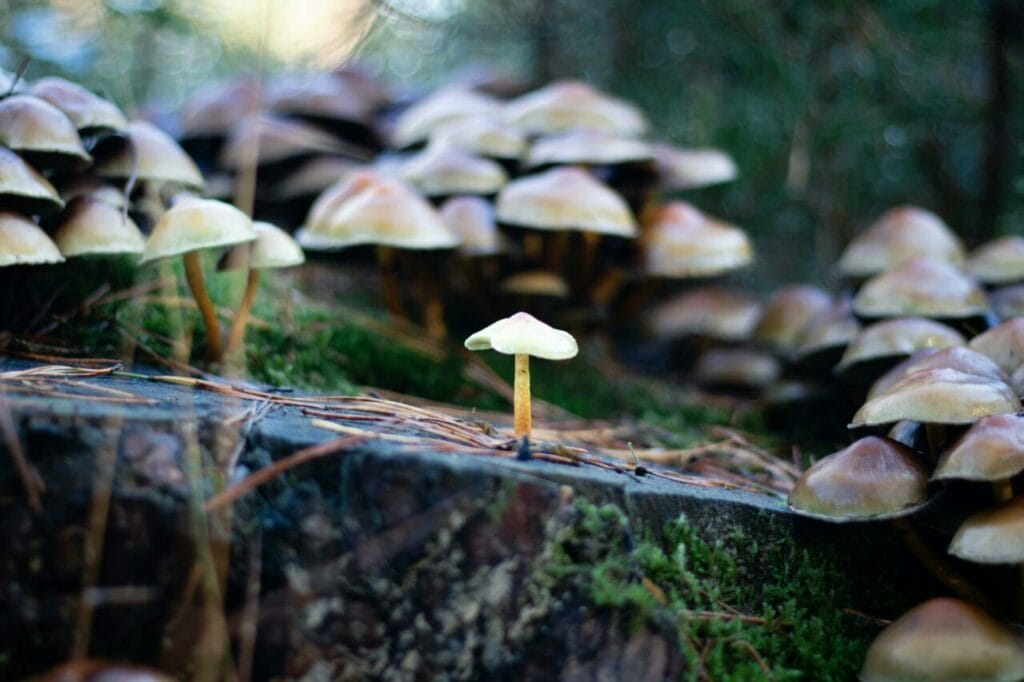Alzheimer’s Disease (AD) is a crippling neurological condition with no known cure. Its increasing occurrence presents a substantial challenge. Researchers are investigating enhanced treatment approaches by studying both natural and synthetic options.
Several clinical studies highlight the promising potential of serotonergic psychedelics such as LSD, DMT, and psilocybin, for treating Alzheimer’s disease. For more fascinating information, explore online resources or consider “purchasing psychedelics online in Canada.”
[toc]
The Influence of Psychedelics in Alzheimer’s Treatment
Conventional psychedelics demonstrate potential in treating initial-stage Alzheimer’s Disease (AD) or mild cognitive impairment (MCI) by fostering the development of brain cells.
Psychedelics may encourage neural adaptability for learning and memory by focusing on particular brain receptors. This could potentially decelerate or even counteract the neurodegenerative effect of AD. Additionally, psychedelics may help alleviate depression and anxiety, which are often linked with AD patients, by inducing positive psychological responses.
Doubts remain about the operation of psychedelic treatments. Some suggest that undergoing profound effects from high-dose psychedelics, such as mystical sensations or a sense of self-dissolution, is vital for obtaining psychological benefits. Others argue that the key is in the biological changes prompted by these substances. Both viewpoints may carry truth.
Conventional psychedelics appear to aid the brain in adapting and reducing inflammation, even at smaller doses. Therefore, low-dose treatments could potentially benefit conditions like brain degeneration or migraines without significant mind-altering effects. However, for conditions like depression, anxiety, or addiction, the mind-altering effects seem essential, leading to self-reflection and behavioural modifications. Thus, both low and high doses deserve investigation for personalized treatment.
Impacts of Serotonergic Psychedelics
Serotonergic psychedelics, including LSD (lysergic acid diethylamide), DMT (dimethyltryptamine), and psilocybin (found in magic mushrooms), are garnering attention
There is a growing interest in the potential therapeutic effects of certain substances on a range of mental health disorders.
Conditions that can potentially benefit from these substances are increasingly being studied.
Specialists in the field point to serotonin receptors – known for their cognition-enhancing and neuroplasticity-modulating properties – as a promising avenue for research into Alzheimer’s Disease (AD).
The pharmacological effects of these substances mainly arise from changes they induce in the brain’s serotonin system, leading to alterations in perception, mood, and consciousness. Several studies support this assertion:
- In particular, the 5-HT2A subtype of these receptors influences the gene expression of neuroplasticity-enhancing neurotrophins in brain regions that AD impacts.
- These receptors control cortical signalling, essential for cognition, memory, and synaptic plasticity.
- Despite their irregular distribution within neurons, serotonin receptors play a role in neural development, regeneration, and plasticity.
Significant Research Findings
- Serotonergic psychedelics have shown promise in alleviating facets of AD pathology by promoting neuroplasticity.
- Traditional psychedelics influence neurotransmission, stimulate synaptic remodelling, and enhance factors that promote neuronal survival.
- Certain psychedelics, such as muscimol and Sig-1R agonists, may reduce the neurotoxicity associated with AD progression.
- Traditional psychedelics activate pathways in brain regions affected by AD, suggesting the potential to slow down or even reverse brain degeneration.
- Psilocybin mushrooms stimulate neural plasticity, encouraging neurogenesis and effecting lasting changes in brain circuits.
- Psychedelics improve brain connectivity by targeting receptor genes and triggering changes in neurons and networks.
Clinical studies suggest that both traditional and non-traditional psychedelics derived from magic mushrooms affect numerous biological processes in the brain. These impacts include swift changes in gene expression and profound changes in brain structure and function.
These psychedelics interact with receptors such as serotonin, sigma, NMDA, and GABA, leading to increased synaptic plasticity and brain rejuvenation. As such, psychedelics could potentially have beneficial effects on behaviour, memory, and cognition, making them hopeful prospects for treating AD and related disorders.
Acquire Psychedelics Online in Canada
Welcome to our online dispensary, where we offer a broad selection of psychedelic products, available for purchase in British Columbia, Canada. If you’re considering microdosing with magic mushrooms, we advise starting with a reputable medicinal mushroom dispensary.
- LSD
LSD is a synthetic compound derived from a fungus called ergot that grows on rye grains. Even in minute amounts, this psychoactive substance can transform perceptions, feelings, and thoughts.
Be aware, excessive LSD consumption may lead to severe hallucinations and a distorted sense of time and space. Exercise caution, as substances marketed as LSD could potentially be other drugs like NBOMe or members of the 2C drug family.
| Product | Kittease – Ketamine Microdose Troche (30x50mg) | Zenly – LSD Gel Tabs – 600ug (100ug Per Tab) | Zenly – LSD Gummies – Sour Zen Berry – 200ug (100ug Per Gummy) |
| Intended Use | For stress, depression, pain management, PTSD, OCD, work-related stress, performance anxiety, insomnia, and addiction. | For extraordinary experiences | For extraordinary experiences |
| Dosage | 50mg per troche / 30 per pack – 1.5 grams of ketamine/ per pack | 600ug total/6 Tabs (100ug/Tab) | 200ug total/2 Gummies (100ug/Gummy) |
| Usage Guidelines | Consume one full troche | Take one full tab for the full experience. Wait a minimum of 2 hours before taking another. | Consume one full gummy for the complete effect. Allow a minimum of 2 hours before taking another. |
| Benefits | Quick action with minimal risk, enhanced receptivity, ideal for self-reflection and cognitive enhancement. | Dose measured to perfection for the optimal trip, lab-verified | Dose measured to perfection for the optimal trip, lab-verified |
- Magic Mushrooms
Over 180 species of mushrooms are known to contain psilocybin and psilocin, compounds acclaimed for their therapeutic benefits and positive effects on overall mental health.
on mental well-being.The experience can vary depending on factors such as the type of mushroom, the cultivation batch, the consumed amount, and the individual’s tolerance. While some people prefer microdosing for milder effects, others opt for larger doses for a more significant experience. The quality may also differ based on the cultivation practices used.
The Blue Meanies, scientifically referred to as Panaeolus cyanescens, are small dried fungi that flourish in warm tropical climates, typically on cow and water buffalo dung. They develop blue spots on their surface as they mature, which is how they got their name.
- These fungi boast high concentrations of psilocybin and psilocin.
- They have a history of recreational use, particularly among the Balinese people, who ingest them during celebrations and for artistic inspiration.
- Because of their hallucinogenic properties, they are popular amongst tourists and travelers in Bali and similar locations. These effects can include feelings of joy, hallucinations, happiness, and intense laughter.
- DMT
DMT, a potent hallucinogenic substance, is present in certain plants like Psychotria viridis and Chacruna. Often known as the “spirit molecule,” these regulated substances can trigger profound psychedelic experiences. They offer a short yet intensely immersive journey characterized by colorful visual and auditory hallucinations.
| Product | Dream Machine – Vape Cartridge – DMT 1ml | Integral Alchemist – ACACIA Changa Pre-Roll | Integral Alchemist – Mimosa- 1ml DMT Vape Cart |
| Description | Explore hyperdimensional realms with DMT. | Feel the effects akin to ayahuasca, with a mix of herbs and DMT. | Embark on a journey of mystical visions and spiritual enlightenment with DMT. |
| DMT Content | 1g | Approximately 90mg | 1ml |
| Instructions | Preheat the cartridge and inhale | Take your time when smoking a pre-roll. | Inhale the vapor for instant effects. |
| Effects | Intense hallucinations, altered consciousness. | A long-lasting visual psychedelic experience. | Euphoria, spiritual enlightenment, dramatic changes in perspective. |
| Duration | Varies for each individual | Can last up to 1 hour | Can last up to 30 minutes |
Understanding the Long-Term Effects of Psychedelic Use
Current research is focused on understanding the long-lasting implications of using psychoactive substances. The term “long-term effects” is used to describe any persistent changes in cognition, emotion, or memory following the prolonged use of psychedelics.
The study of long-term effects of psychedelics is complex. Some studies suggest potential benefits for mental health, while others indicate possible risks, such as the onset of psychosis.
Despite these complexities, scientists persist in their efforts to understand the effects of long-term psychedelic use on mental health. They conduct careful research and monitor subjects over extended periods to gather more accurate data.
Purchasing Cannabis from a Certified Vendor
Research suggests a significant shift in Alzheimer’s disease treatment, indicating that psychedelics could revolutionize the approach to brain disorders. Experts predict that the therapeutic use of these substances could completely change Alzheimer’s treatment, providing renewed hope for numerous patients and their families.
For premium quality products, select a certified vendor like Sero Canada. Offering a wide range of cannabis products, including flowers, edibles, concentrates, and more, Sero Canada ensures genuine, lab-tested items that meet strict food and drug regulations.
Place your order for shrooms online now.
Frequently Asked Questions
How do psychedelics differ from other substances typically used in Alzheimer’s treatments?
Psychedelics distinguish themselves from traditional Alzheimer’s medications through their therapeutic approach and effects. They target the brain’s serotonin system to stimulate new neural connections, promoting emotional well-being through profound psychological experiences.
Unlike standard drugs that primarily manage symptoms, psychedelics are being assessed by Health Canada for their lasting benefits and holistic treatment approach, which includes therapy.
Research into the use
The potential of psilocybin to treat conditions like obsessive-compulsive disorder, and its safety record in preventing multi-system organ failure, distinguishes it from conventional controlled substances.
Is the application of psychedelic-assisted therapy viable for Alzheimer’s patients experiencing distress at the end of their life?
Psychedelic-assisted therapy might offer advantages to Alzheimer’s patients who are critically ill and facing end-of-life challenges.
- It offers emotional comfort. This therapy type has been seen to relieve anxiety and sadness in some people, especially those who are critically ill. This could potentially be beneficial for Alzheimer’s patients as well.
- Generally safe when monitored. When given in a safe setting under the supervision of a professional therapist, the use of psychedelics like this generally poses no threat, and is well-received by most individuals.
- Possibly improves quality of life. For an Alzheimer’s patient, an emotional boost could make a substantial difference, regardless of no improvement in memory issues.
- Further research is required. While this therapy seems promising, more studies are needed to validate its safety and effectiveness for Alzheimer’s patients, especially those approaching the end of their lives.
What is the length of a psychedelic therapy session for Alzheimer’s patients?
- Preparation Stage. This stage includes one or two sessions that last from 1 to 2 hours each. The aim of these meetings is to ready the patient for the upcoming experience, establish expectations and build trust with the therapist.
- Primary Psychedelic Session. This crucial session, where the patient consumes the psychedelic substance, typically lasts between 4 to 6 hours. The patient spends this time in a controlled setting, usually lying down with eye shades on and listening to music, while therapists closely supervise.
- Integration Stage. After the session, follow-up meetings are held to help the patient understand and incorporate their experience. These meetings usually last 1 to 2 hours each, with the number of sessions differing.
Also, you might want to check out:





